Past and present

PRIVACY’s historical research puts human agents at the centre and shows how a wealth of factors influence perceptions and practices related to privacy. These insights prompt questions regarding current notions of privacy. We ask such questions in an ongoing exchange with scholars and practitioners working on privacy today.
PRIVACY is dedicated to historical research. We aim, however, to show that this research is of relevance for contemporary privacy debates. Historical research informs contemporary privacy debates on three fronts.
- Historians study human beings, and historical research reminds us that no matter how sophisticated they are, technologies are shaped, administered and deployed by human beings who are influenced by their cultural and social contexts.
- Historians study cultural, socio-economic, religious, technological and material contexts. Historical research is fit to highlight the cultural baggage of notions such as privacy. The European baggage of privacy is of interest when data flows, legislative efforts and technological innovations are administered on a global scale that cross national and cultural borders.
- Historians study the interaction of societal factors. Historical research thus reminds us that also our contemporary notions of privacy are coloured by implicit and explicit societal factors, including societal norms, distribution of wealth and power as well as belief systems.
Searching for privacy and the private brings out deep insights concerning relationships between individuals and community, material and immaterial space, domestic and familial structures, issues to do with property, security, beliefs, bodily norms and more. In our historical research we study when, why and how past people expected, curbed, forfeited, claimed and protected privacy, and when, why and how visions and notions of privacy and the private collided with ideals and practices related to what is regarded as common, professional, public, apparent, and so on.
This historical research has relevance for current discussions. Historical privacy studies remind contemporary scholars and practitioners that technologies, laws and practices are produced and administered by and directed at human beings, each of whom is determined by cultural and socio-political factors. The historical research thus helps us to pose questions regarding the assumptions that underlie contemporary
Profile articles
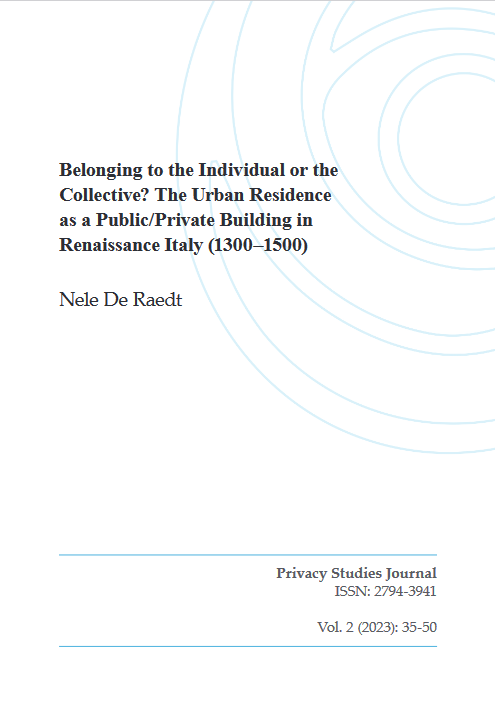 |
De Raedt, N. (2023). Belonging to the Individual or the Collective? The Urban Residence as a Public/Private Building in Renaissance Italy (1300-1500). Privacy Studies Journal, 2, 35–50. https://doi.org/10.7146/psj.v2i.132278 |
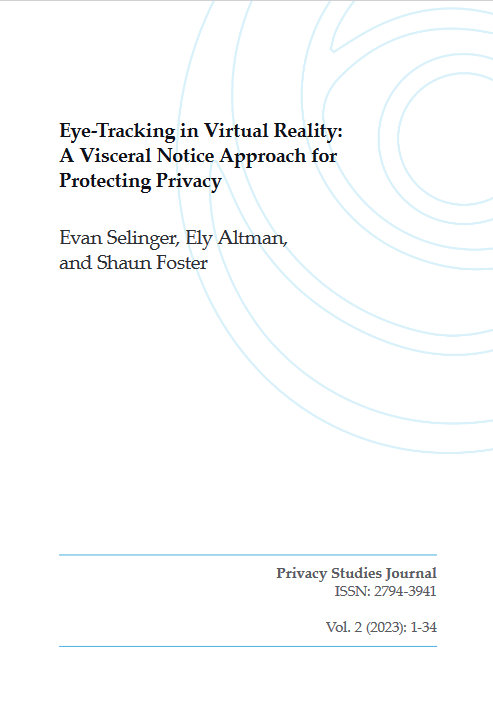 |
Selinger, E., Altman, E., & Foster, S. (2023). Eye-Tracking in Virtual Reality: A Visceral Notice Approach for Protecting Privacy. Privacy Studies Journal, 2, 1–34. https://doi.org/10.7146/psj.v2i.134656 |
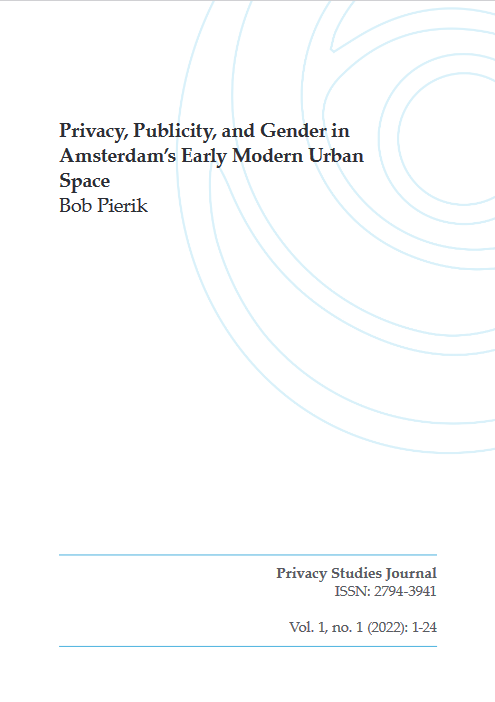 |
Pierik, B. (2022). Privacy, Publicity, and Gender in Amsterdam’s Early Modern Urban Space. Privacy Studies Journal, 1, 1–24. https://doi.org/10.7146/psj.vi.129332 |
 |
Bebnowski, D. (2022). Writing in Privacy to Mass Publics: The Pamphleteer as an Activist Writer. Privacy Studies Journal, 1, 25–50. https://doi.org/10.7146/psj.vi.129999 |
 |
How to CiteFiebig, T., Gürses, S., & Lindorfer, M. (2022). Position Paper: Escaping Academic Cloudification to Preserve Academic Freedom. Privacy Studies Journal, 1, 51–68. https://doi.org/10.7146/psj.vi.132713
|
Lee, “The Specular Home: Voyeurism, Vanity & Videotelephony”. Paper at Stay Home Stories Symposium ‘Home & COVID-19: Dwelling and belonging in pandemic times’, Museum of the Home, London 25.-26.11.2021.
Larsen, “Emotional Echoes as an Analytical Tool, and Collective Experiences of Family Violence in Denmark, 1970-2020,” Seminar presentation at HEX – Academy of Finland Centre of Excellence in the History of Experiences, Tampere University, Finland, 23.11.2021.
Kristensen, “Crisis and Kairos”. Paper at North American Paul Tillich Society - Annual Meeting, 19.11.2021.
Lee, “An Atomised Dweilling: Inhabiting the In-between Realm”. Paper at House, Home and the Domestic Symposium, Coventry University / Centre for Arts, Memory and Communities, Coventry, UK, 22.10.2021.
Winthereik, “Homely Digital Spaces”. Lecture in the lecture series ‘Das Zeug’, Royal Danish Academy, Copenhagen, 7.10.2021.
Lee, “The Specular Interior Exhibition Concept”. Presentation at Design Museum, Copenhagen, 21.09.2021.
Bruun, “The Neighbour between Public and Private Domains”. Neighbor-Love: Poetics of Love and Agape, Conference at The Royal Swedish Academy of Letters, History and Antiquities, Stockholm, Sweden, 3.09.2021.
Lee, “STAY HOME: Dwelling in a Time of Social Distancing”. Presentation at Center for Interior Studies, The Royal Danish Academy, 22.06.2021.
De Neergaard, “Digitalization of the private sphere during lockdown”. Paper at Pandemic Tech Conference 2021, Queens University Belfast, 16.06.2021.
Kristensen, “Det privates zoner hos Le Corbusier”. Seminar related to the exhibition PRIVACY (wilding) by Asmund Havsteen-Mikkelsen, The Royal Danish Academy, Copenhagen, 10.06.2021.
Bruun, “Den lukkede Have”. Seminar related to the exhibition PRIVACY (wilding) by Asmund Havsteen Mikkelsen, The Royal Danish Academy, Copenhagen, 10.06.2021.
Larsen, “Det hjemlige, det hemmelige og det private”. Seminar related to the exhibition PRIVACY (wilding) by Asmund Havsteen-Mikkelsen, The Royal Danish Academy, Copenhagen, 10.06.2021.
De Neergaard, “Experiencing privacy: Digitalization of the private sphere during lockdown”. Paper at Nordic Science and Technology Studies Conference, Copenhagen, 20.-21.05.2021.
Bruun, “Comprehending Privacy: Approaches and Perspectives”, Privacy Studies Journal Inaugural Conference, Copenhagen, online, 26.04.2021.
Events
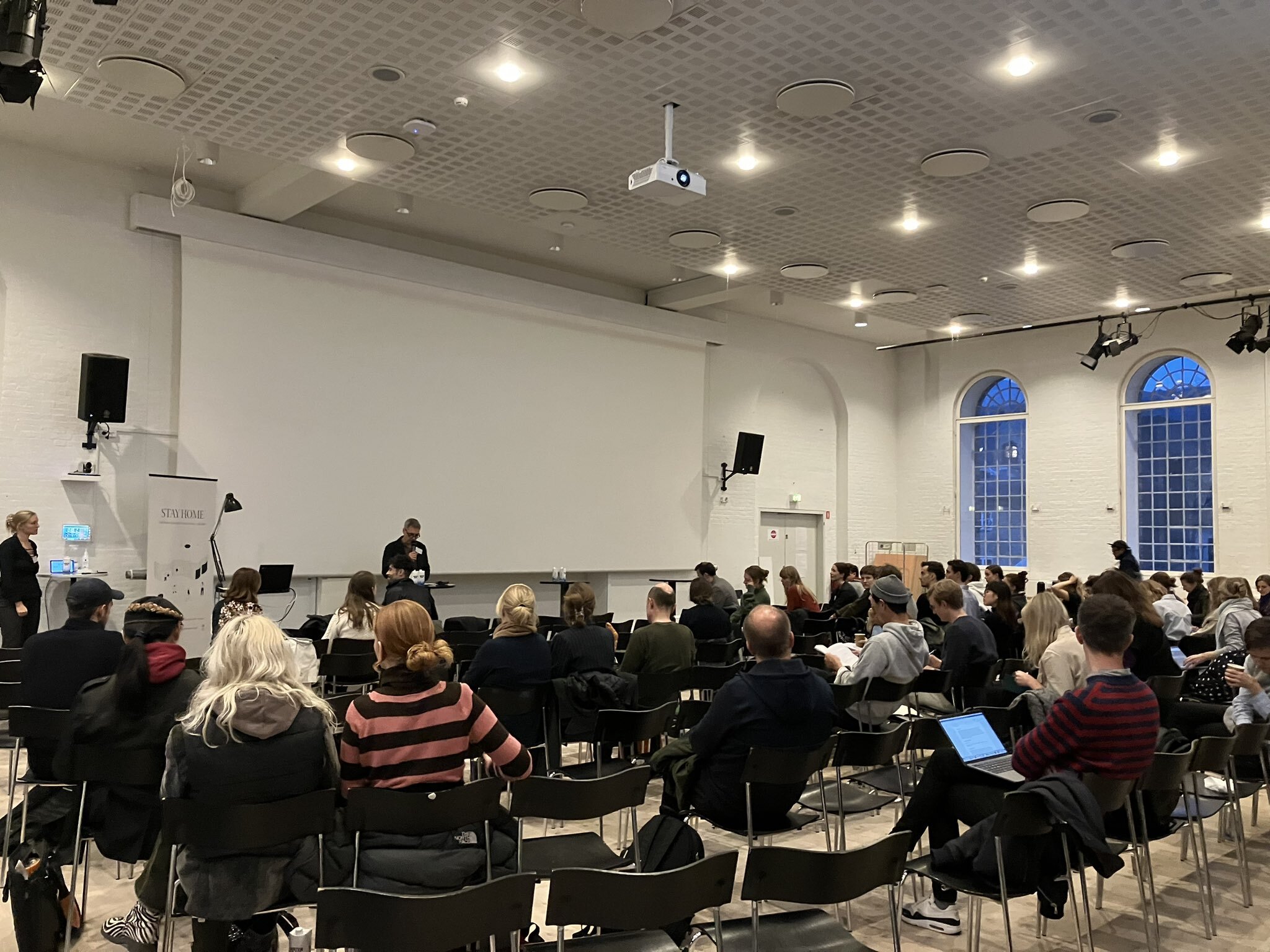
Hospitals in the Home: workshop in Danish.
Domestic Fantastic, interdisciplinary symposium with architects and practitioners, 30 November 2023.
STAY HOME: New Perspectives on the Home interdisciplinary conference, 10-11 November 2022.
Mette Birkedal Bruun, “Privacy and Prayer in the History of Christianity” (opening keynote lecture), International Association of Privacy Professionals Europe: Data Protection Congress, Brussels, 16 November 2022.
Mette Birkedal Bruun, “Privacy: A Church Historical Perspective” The British Government Department for Digital, Culture, Media and Sport, London, 17 August 2022.
Mette Birkedal Bruun, “Privacy Talk with Mette Birkedal Bruun, Professor of Church History at the University of Copenhagen”, interview with Kohei Kurihara, Privacy by Design Lab, Tokyo, posted on Youtube 8 August 2022.
“Privacy Past and Present” all-day workshop at Computers, Privacy Data Protection conference, Brussels, 24 May 2022.
Privacy Studies Journal inaugural conference, 26-28 April 2021.
Partner projects
 |
STAY HOME: The home during the corona crisis – and after, interdisciplinary collaborative project, running 2020-25, funded by the Carlsberg Foundation and directed by Mette Birkedal Bruun. |
 |
Privacy Studies Journal, Open Access, international and highly multidisciplinary research journal with double-blind peer-review; Mette Birkedal Bruun is editor in chief. |
| Privacy Salon, Brussels. | |
 |
Privacytopia, an arts festival dealing with data-usage and its implications on individuals and society. Mette Birkedal Bruun is on the advisory board since 2022. |
| RAID - Regulation of AI, Internet & Data; read the interview with RAID conference director Ben Avison on the partnership between RAID and PRIVACY here; read Avison’s interview with Mette Birkedal Bruun for the RAID homepage here. | |
 |
International Association of Privacy Professionals (IAPP); two PRIVACY summer school students have won the IAPP Westin Award: links here and here. |
Presentation of theme leader, Mette Birkedal Bruun
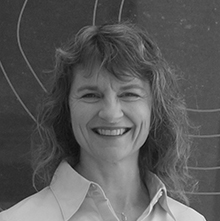
|
I study devotional history. This expertise has alerted me to the cultural, social and religious baggage of historical perceptions of privacy. These historical insights incite questions regarding contemporary notions of privacy: what are the convictions and assumptions regarding good and evil, right and wrong that shape our current understanding of privacy? Read more about my research here |
